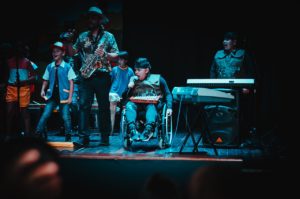Special Needs

Looking for information on special needs music lessons? The Successful Music Student blog archive contains posts about teaching special needs music.
Special Needs
Catchall Term
The name special needs functions as a catchall term. The name says it all. Special needs students have special needs above and beyond the typical learner student. This can include students with:
They are all Different
Beyond the common factor that all these students have special requirements, they all relate to the world around them in diverse ways. They sometimes:
- learn differently
- socialize differently
- act differently
- move differently
- converse differently
- need adapted gear or learning supplies
This means that students need to be met where they are at, and the teaching process needs to be tailored to them.
This does not mean that they will all learn, socialize, act, move, or converse in the same ways. Two students with special needs can be vastly different from each other. Even two students with the same diagnosis can be extremely different from each other.
OR two students may have similar traits, even with different diagnoses. It really depends on the student what you get.
Some students will socialize fine, but have problems with reading, math, or writing. Other students have no problems learning in school, but will find socializing difficult.
Still others will be fine with learning and socializing. Nevertheless, they will need a wheelchair or have issues with muscle strength or coordination. Some students may have problems saying words clearly or need a talker. However, they have no problems with any of the issues mentioned earlier. Finally, some students may have aspects of many or all of these issues blended together.
This makes teaching a challenge. Yet, it is a challenge worth taking up. Also, with multisensory teaching methods, you can win the challenge, and the student can learn.
© 2021 Geoffrey Keith
Back to the Successful Music Student Blogs page



![Prodigy Meaning (Examples of Special Talent in Music) [Video] - Children Playing Music - Sing the Charming Song London Bridge Is Falling Down](https://successmusicstudio.com/wp-content/uploads/2024/05/Prodigy-Meaning-Examples-of-Special-Talent-in-Music-Video-Children-Playing-Music-1024x682.jpg)




![Amnesia, Alzheimer’s, Stroke, and Color Coding Music - Elderly Accordion Player - Perfect Pitch: Discover the Truth [Plus Absolute Pitch Test]](https://successmusicstudio.com/wp-content/uploads/2024/01/Amnesia-Alzheimers-Stroke-and-Color-Coding-Music-Elderly-Accordion-Player-1024x1024.jpg)


